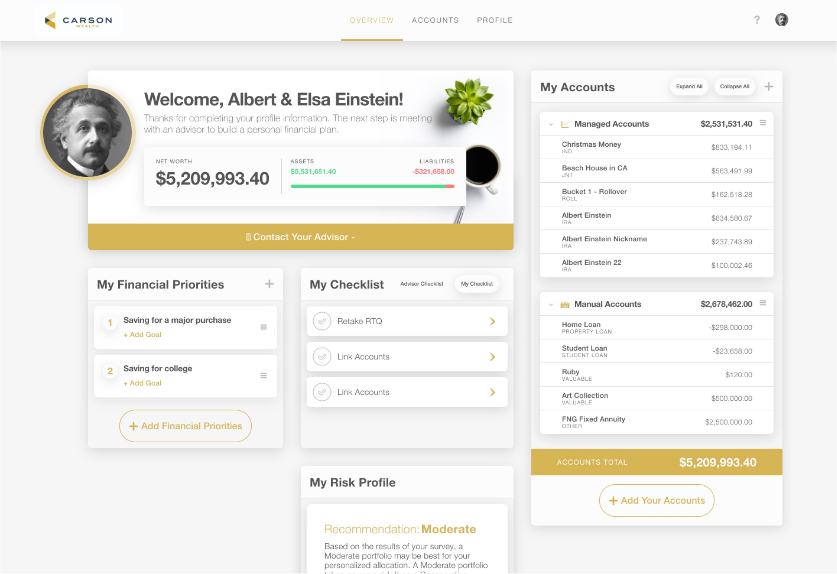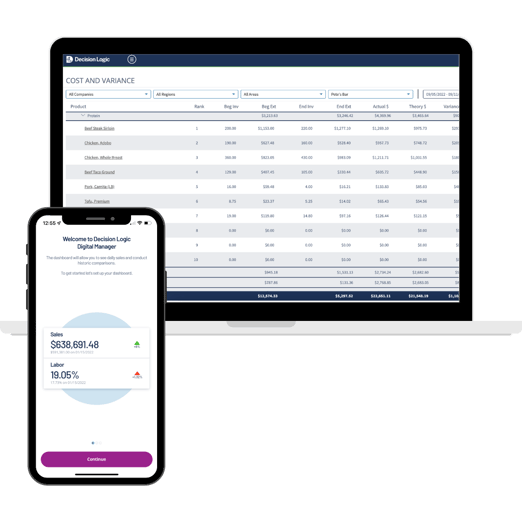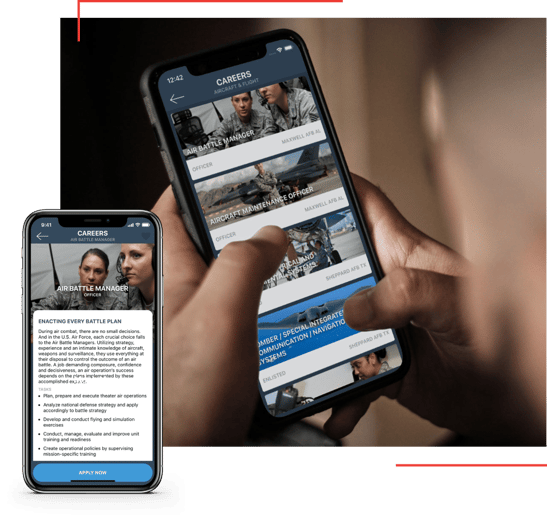UX | guardian | Air Force | Technology | Decision Logic | Carson Wealth
Designing a great user experience is more than just updating your website or application's user interface — it encompasses everything your users interact with. In addition, every dollar invested in UX results in a return of $100 — generating an ROI of 9,900%.
In a world where customer-centric companies are 60% more profitable, it pays (literally) to prioritize UX.
Understanding why user experience is important will have a positive impact on your business — the same as it did for these four companies.
Carson Group
As the financial industry continues to try to capture a younger audience, Carson Group approached us with the task of revamping their platform with a new and updated user dashboard that would appeal to a younger generation. However, in collaborating with Carson Group to delve deeper into the problem, we discovered there was a significant amount of data that would be incredibly useful to clients, advisors, and other shareholders if fully utilized while still fulfilling the design requirements of their younger personas.
The new goal became to develop a new user experience that improved access to data that was already being analyzed behind the scenes, encourage advisors to further engage with systems, and combine multiple unique software programs and interfaces into one central view.

The result was a very promising initial rollout. In just the first two weeks of trials, Carson Group saw adoption rates between 50-75%: a massive increase when compared to the 10-13% that the old platform brought in. This new platform also laid the foundation for Carson advisors to be able to use predictive analytics to offer solutions based on customer behavior. As a result, advisors can save time, work with more customers, and ultimately position Carson Group for scalable growth.
Decision Logic
The first connection that happened years ago between Aviture and Decision Logic, a company specializing in back office restaurant software, came when Decision Logic realized it needed help with the UX design of its food usage and waste variance management systems. Mandi Wooledge, Decision Logic's President and COO said:
“You had to dig and dig and dig in the data in order to get some of the information out about food waste, labor optimization, resource use, those sorts of things. Aviture came to the table to help us help our customers understand what they were looking at and where their problems were.
This was at a time when many restaurants still relied heavily on a wide array of disparate documents to track their data, if it was being tracked at all. Decision Logic needed a better, more efficient way of taking the customer data out of manual systems like Excel and putting that data into a dashboard that was highly visual, with the user capable of seeing top-level insights at once and conducting a deep dive on more specific analytics.
Aviture’s consultants helped Decision Logic rethink the product through the lens of UX design, drilling down on what’s important for managers and operators to find quickly. This was the kind of visualization that previously wasn’t possible unless managers were willing to spend hours digging into the data and customizing their systems for display, and even then it left something to be desired, as quick pullout insights still weren’t possible.

Decision Logic’s newfound ability to display this information, incrementally, high-level, and on the fly, became instrumental in allowing managers to determine their margins and adjust as needed. At all times, UX design was emphasized in order to ensure maximum efficiency and to help managers get out of the restaurant at a reasonable hour. John Barber, Chief Product Officer at Decision Logic said:
“After working alongside Aviture and receiving access to various resources and a wide array of talent, we were able to transform our product from effective but complex to effective and easy to use for our customers.”
Today, Decision Logic's platform has grown to a best-in-class solution for back office restaurant management. They offer instant access to data, labor scheduling, line checking, inventory management, the Logic Shield PCI security system, and more. These tools create an all-in-one solution so restaurant operators can focus on providing the best experience for their customers.
U.S. Air Force and Space Force Recruiting: Aim High
Over 50% of 17 to 21-year-olds in the United States do not have a parent or relative who was in the military. Because of this, they usually have limited knowledge of the military and its offerings. There are 20 million 17 to 21-year-olds in the United States, but only 4.4 million are eligible to join the military and only 465,000 are compelled to join.
The Aim High App was created to draw in non-traditional recruits while expanding non-traditional networking. The app opens communication channels using rich “social-like” content to communicate with the families and friends of recruits in ways that create a positive network, leading to recruiting success and career retention.

This new user experience for potential recruits and their families creates a significant increase in civilian exposure to the opportunities the Air Force provides, a more efficient line of communication for recruiters, and an increase in quality candidates for the Air Force.
Department of Defense: Guardian
When the Department of Defense came to Aviture, their Remotely Piloted Aircraft (RPA) application consisted of multiple tables of data and an overly complex user interface. This created problems for pilots and mission managers who needed a way to communicate and process data quickly in order to make high-stakes decisions. Agile innovation and procedural change in the government sector can also be difficult to enact with a high level of security and a long list of requirements to meet.
With Aviture’s many engineers with military backgrounds, we were in a great position to assist in developing a new solution that was efficiency-focused while still sticking to government guidelines. The Department of Defense was working with several different systems which, if integrated and made user-friendly, could greatly improve mission efficiency and even create new opportunities.
The Aviture team created an entirely new user experience that integrates with over 20 different government systems and sources. UX designers were able to evaluate the nuances of the RPA pilots’ environment during system use, which translated into an interface that brought forward critical information as needed. Aviture combined a web browser-based environment with a modern, open architecture design to provide the necessary situational awareness data to the user in a timely and secure manner that encapsulated their workflows.

A platform named “Guardian,” the resulting software is a near-real-time, geospatial application that displays data from multiple streaming sources. The application even allows users to create an operational picture that can be used as a singular display for planning, operations, and intelligence information. The application has gone on to be used in rescue efforts for Hurricane Harvey and the California wildfires and to provide security for the Boston Marathon and the Super Bowl.
Why UX Design Is Important for Your Company
Ease of use, design, capability, and the hospitality of your company or organization all play a part in making you stand out from the competition. When a potential client is shopping around for a solution to their problem, the business which left a lasting impact and provided a memorable experience is going to end up being more desirable. The same can be said about maintaining clients as well — a lack of UX design can and does lead to a high turnover rate.
If your business is having a hard time connecting with or keeping customers, it might be time to invest in improving your user experience.
At Aviture, our mission and belief is that software doesn’t mean anything unless it solves a problem, so we create technology to enable users, open possibilities, and create meaningful business impact.
Innovation built on intent and powered by collaboration can take us beyond any obstacle. To get in touch with us about launching your next revolutionary tech adventure, contact us today.




